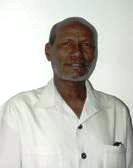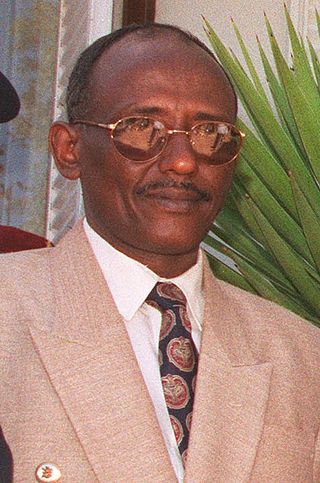Related Research Articles

Dileita Mohamed Dileita is a Djiboutian politician who was the prime minister of Djibouti from 7 March 2001 to 1 April 2013. He was vice-president of the People's Rally for Progress (RPP), the governing political party, until 2012. He also served as president of the Union for the Presidential Majority (UMP), the governing coalition. He was elected President of the National Assembly on 5 March 2023.

The People's Rally for Progress is a political party in Djibouti. It has dominated politics in the country since 1979, initially under the rule of President Hassan Gouled Aptidon. Today it is led by President Ismaïl Omar Guelleh and is in a coalition government with Front for the Restoration of Unity and Democracy (FRUD) and other parties. The RPP tends to hold more influence among the Issa population.
The National Democratic Party is a political party in Djibouti. It was founded as an opposition party in 1992 by Aden Robleh Awaleh, who remains the party's president. It was part of the ruling coalition in 2005, but has since rejoined the opposition against President Ismaïl Omar Guelleh.

The Front for the Restoration of Unity and Democracy is a political party in Djibouti. It is aligned with the interests of the Afar people who live in that country, although it has supporters residing outside of Djibouti.

Barkat Gourad Hamadou was the Prime Minister of Djibouti from 2 October 1978 until 7 March 2001.
Ali Abdi Farah is a politician in Djibouti. He belongs to the Habr Awal subclan of the Isaaq.

Ahmed Dini Ahmed was a Djiboutian politician. He was trained as a health technician and entered the political realm at age 26.
The Social Democratic People's Party is a centre-left, social democratic political party, in Djibouti, founded in 2002 and led by Moumin Bahdon Farah. It is part of the governing coalition, the Union for a Presidential Majority (UMP).
Idriss Arnaoud Ali was a Djiboutian politician who was President of the National Assembly of Djibouti from 2003 to 2015. He was also the Secretary-General of the People's Rally for Progress (RPP) from 2003 to 2012.

Aden Robleh Awaleh (1941 – 31 October 2014) was a Djiboutian politician and President of the National Democratic Party (PND). He was a member of the National Assembly of Djibouti.
Ahmed Mohamed Hassan is a Djiboutian politician. He is a member of the People's Rally for Progress (RPP) and has served in the National Assembly of Djibouti as well as the Pan-African Parliament.
Mohamed Abdoulkader Mohamed is a Djiboutian politician. He is a member of the National Assembly and a member of the Pan-African Parliament from Djibouti.
Souleiman Miyir Ali is a Djiboutian politician and a member of the Pan-African Parliament from Djibouti.
Hasna Mohamed Dato is a Djiboutian politician and a member of the Pan-African Parliament from Djibouti.

Parliamentary elections were held in Djibouti on 8 February 2008. There were 65 candidates running for the 65 seats in the National Assembly, with all of the candidates coming from the ruling coalition, the Union for the Presidential Majority (UMP). The opposition boycotted the election, and the UMP won all 65 seats.
Moumin Bahdon Farah was a Djiboutian politician and the President of the Social Democratic People's Party (PPSD). He was Minister of Foreign Affairs from 1978 to 1993 and Minister of Justice from 1993 to 1996. Concurrently, he was a member of the National Assembly of Djibouti.
Mohamed Dini Farah is a Djiboutian politician. He is a former minister and President of the Parliamentary Group of the People's Rally for Progress (RPP), currently serving as a deputy in the National Assembly of Djibouti.
Ali Mohamed Daoud, also known as Jean-Marie, is a Djiboutian politician and the President of the Front for the Restoration of Unity and Democracy (FRUD). He is currently a member of the National Assembly of Djibouti.

Ougoureh Kifleh Ahmed is a Djiboutian politician who served in the government of Djibouti as Minister of Defense from 1999 to 2011. He has also served as Secretary-General of the Front for the Restoration of Unity and Democracy (FRUD).
Mohamed Ali Mohamed was a Djiboutian politician of the People's Rally for Progress (PDP).
References
- ↑ "Les congressistes du PSD plébiscitent la candidature du Président Guelleh" Archived 2005-03-08 at the Wayback Machine , La Nation, 26 November 2004 (in French).
- 1 2 3 4 5 6 "Short CV at National Assembly website" (in French). Archived from the original on 2005-12-02. Retrieved 2005-12-02.
{{cite web}}: CS1 maint: bot: original URL status unknown (link). - 1 2 "Djibouti: Political opposition parties (This Response replaces an earlier version dated 13 January 1999.) Archived 20 May 2011 at the Wayback Machine ", Immigration and Refugee Board of Canada (UNHCR Refworld), DJI31018.FE, 1 February 1999.
- ↑ "Décret n°92-0035/PR/MI portant approbation des résultats d’une enquête démographique intercensitaire." Archived 2006-05-17 at the Wayback Machine , Journal Officiel de la République de Djibouti, 24 March 1992 (in French).
- ↑ "Arrêté n°92‑0743/PR/MPAM portant modification et renouvellement de la liste des membres du Conseil d'Administration du Port." Archived 2006-05-17 at the Wayback Machine , Journal Officiel de la République de Djibouti, 13 August 1992 (in French).
- ↑ "Décret n°92-0129/PR/INT Abrogeant et remplaçant le décret n°92-0124/PR/INT du 16 novembre 1992 portant publication des listes de candidats et ouverture de la campagne électorale pour les élections législatives du 18 décembre 1992." Archived 2008-10-02 at the Wayback Machine , Journal Officiel de la République de Djibouti, 1992 (in French).
- ↑ "Mar 1996 - Government changes", Keesing's Record of World Events, Volume 42, March, 1996 Djibouti, Page 40987.
- 1 2 3 4 "CIVIL AND POLITICAL RIGHTS, INCLUDING THE QUESTION OF: INDEPENDENCE OF THE JUDICIARY, ADMINISTRATION OF JUSTICE, IMPUNITY", United Nations Economic and Social Council, E/CN.4/1999/60, 13 January 1999.
- ↑ "Décision n°96-01/CC" Archived 2007-08-16 at the Wayback Machine , Journal Officiel de la République de Djibouti, 31 July 1996 (in French).
- 1 2 3 "Loi n°140/AN/01/4ème L portant Amnistie." Archived 2007-08-16 at the Wayback Machine , Journal Officiel de la République de Djibouti, 1 October 2001 (in French).
- ↑ "Djibouti ex-ministers on coup plot charges", BBC News, 6 September 1998.
- ↑ "Le nouveau parti politique de M. Moumin Bahdon Farah, le PPDS, voit le jour" Archived 2005-11-10 at the Wayback Machine , ADI, 31 October 2002 (in French).
- ↑ "Décret n°2002-0261/PR/MID Portant publication des listes des candidats en vue des élections législatives du vendredi 10 janvier 2003." Archived 2008-06-22 at the Wayback Machine , Journal Officiel de la République de Djibouti, 25 December 2002 (in French).
- ↑ "Première séance solennelle de la 5ème Législature de l'Assemblée Nationale" Archived 2005-01-19 at the Wayback Machine , ADI, 21 January 2008 (in French).
- ↑ "Liste des 65 candidats de l’UMP pour les législatives de février 2008" Archived 2011-07-16 at the Wayback Machine , ADI, 22 January 2008 (in French).
- ↑ "Idriss Arnaoud Ali reconduit au poste du président de l’Assemblée nationale" Archived 2011-07-16 at the Wayback Machine , ADI, 20 February 2008 (in French).